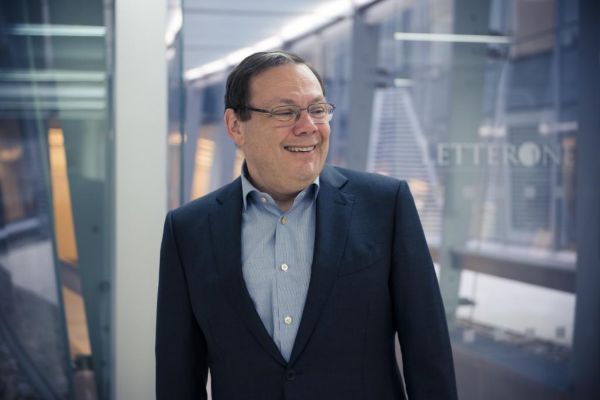- Companies: Fridman signs a former FBI chief for his defense in the 'ZED case'
Mikhail Fridman (Lviv, Ukraine, 1964) receives exultant to THE WORLD after the celebration of the last edition of his jazz contest Rising Stars for young promises, sponsored by his investment holding LetterOne in an evening held in central London. An event in which he presents, microphone in hand, some of the young musical talents he catapults and applauds to rage hidden with a smiling shyness, among the audience attending the gala dinner.
The Russian tycoon - who started in the Soviet Union with a modest window-cleaning business and owns almost 70% of the Dia supermarket chain, the largest private bank in his country and an estimated fortune of about 14,000 million euros - breaks his silence a year after the bid to analyze the situation of the investment of LetterOne, the judicial proceedings in which he is immersed and address the turbulent past and the "successful" imminent future.
"We hope that in the next six months Dia will show its first signs of recovery," says Fridman after having already injected about 1.3 billion euros into the company, after the company sank in the stock market and had to choose to "put money good about bad money »to try to save your multi-million dollar investment. «You have to be patient in investments, being emotional is not advisable». Who initially entered as a simple financial investor emphasizes that he has ended up injecting "money and human capital to take control and turn the company around." «As a reference shareholder, we firmly believe in Dia's future, its managers will create a successful company inside and outside Spain, especially in countries like Brazil. Dia is not in the same position, but in a short time we must compete with Mercadona . Otherwise it would not make sense what we are doing. They are progressing very fast ». That, "despite conspiracy theories against me."
However, after this optimistic and ambitious message, in which he already sets a date at the exit of the tunnel, the bitterness of having been about to lose all his investment and having been involved in judicial proceedings in which his modus is questioned Business operandi to take control of the supermarket company or the much smaller technological Zed.
« Never in my life had I been accused of any crime , I have experienced situations such as going to testify as investigated before the judge, with the risk that this entailed for my company. But the reality is that it makes no sense to accuse me of wanting to sink Dia's action. If I had done so, I would have been shot in the leg, I am a victim of what happened, like the rest of the shareholders. I have put a lot of money, I have run the risk and yet I have suffered more than anyone else.
Of course, he does not shun his own responsibility for what happened and admits, at least, the authorship of "two big mistakes" when it comes to investing. The first was to "rely heavily on public information" of the company, which "has been proven to be false, fake ." Something that, in his opinion, seems "obvious" now, when Justice has just imputed Ricardo Currás, former CEO of the company for makeup accounts, but when he acquired 29% of the company did not notice. " I am especially happy because history is turning around and the investigation is directed against the real perpetrators."
Second, he admits his naivety in thinking that his initial shareholding package would be a "powerful argument for [his representatives] to be heard on the Board of Directors and his view taken into account as experts in the retail sector." On the contrary, "the Council was never receptive to the counselors representing LetterOne, they removed it from important decisions": "It is clear that we did not have the majority, but they felt like strangers and told me that they were hiding information. [...] That is why we had to withdraw our advisors, to avoid incurring responsibilities of a management that was taking the company directly to hell ».
He also claims to have felt mistreated in Spain for being Russian . «Obviously, the company is Spanish and we are foreigners, but we put a lot of money in a legal, transparent and professional way, and we took a lot of risk. In other countries, such as the United Kingdom or the United States, the passport is not important, the important thing is that you put money on the table. They respect you because you put the money and run the risk ».
Regarding his imputation in the National Court after being accused by the Anti-Corruption Prosecutor's Office of preparing a maneuver to keep the Zed technology at a bargain price, he maintains that the owner of that company, Javier Pérez Dolset, “ has already been convicted in the United Kingdom United and Holland for falsifying documents ”and argues that he is accused with“ false documentation ”, which even includes Russian citizens“ who may exist in Russia ”, but those he has not seen in his life.
Within the framework of his judicial affairs, Fridman has signed former FBI director Louis J. Freeh to endorse his performance in the purchase of Zed. " His research has been rigorous and his conclusions are clear, " says who ironically adds that thanks to the problems he has had "he is more prepared than ever to invest in Spain."
According to the criteria of The Trust Project
Know more- Mercadona
Scam The first victims of the 'Txistu Timador': "I am ruined. My wife tried to commit suicide twice"
'Procés' The Court of Auditors begins the process to seize by embezzlement Jové, ERC negotiator with the PSOE
New economy The judge confirms that 532 distributors belong to Deliveroo's workforce

